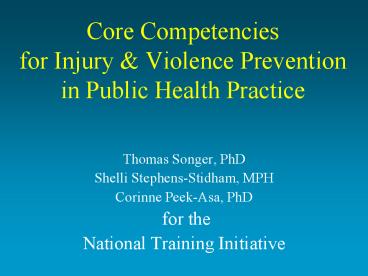Core Competencies for Injury PowerPoint PPT Presentation
1 / 14
Title: Core Competencies for Injury
1
Core Competenciesfor Injury Violence
Preventionin Public Health Practice
- Thomas Songer, PhD
- Shelli Stephens-Stidham, MPH
- Corinne Peek-Asa, PhD
- for the
- National Training Initiative
2
National Training Initiative for Injury
ViolencePrevention (NTI)
www.injuryed.org
3
Goals
- Reduce mortality and morbidity from injury and
violence in the USA and Territories - Through enhancement of infrastructure and core
capacity of state and local violence and injury
prevention programs - By enlarging the pool of trained injury and
violence prevention practitioners
4
Rationale
- seek to identify a set of core competencies
pertaining to violence and injury prevention - The core competencies are designed to..
- represent a set of skills knowledge necessary
for the broad practice of violence and injury
prevention and control - will guide curriculum and content development for
training programs - can guide workforce development efforts
5
Competencies Development Review Process
5. Open for Public Comment
3. Nominate and Appoint Expert Panel of 53
Injury Violence Experts
2. Develop a Review Process
4. Receive Recommendations from Expert Panel
7. Announce Distribute Injury
Violence Prevention Competencies
1. Draft the Essentials of injury
violence prevention
6. Finalize the Injury Violence Prevention Compe
tencies
6
Expert Panel
- 14 years average experience as an injury or
violence prevention professional - 28 expert in unintentional injury
- 8 expert in violence
- 43 expert in both areas
- 26 academics
- 59 manager/supervisor
- 34 coalition leader or program coordinator
- 34 health educator
7
Public Comment
- 48 respondents
- 32 distinct agencies/organizations
- 8 state and local health departments
- 4 federal government agencies
- 5 academic centers
- 7 advocacy based organizations
- 8 clinical care centers
8
Core Competencies
- 1. Ability to describe and explain injury and/or
violence as a major social and health problem - 2. Ability to access, interpret, use and present
injury and/or violence data - 3. Ability to design and implement injury and/or
violence prevention activities
9
Core Competencies
- 4. Ability to evaluate injury and/or violence
prevention activities - 5. Ability to build and manage an injury and/or
violence prevention program - 6. Ability to disseminate information related to
injury and/or violence prevention to the
community, other professionals, key policy makers
and leaders through diverse communication
networks
10
Core Competencies
- 7. Ability to stimulate change related to injury
and/or violence prevention through policy,
enforcement, advocacy, and education - 8. Ability to maintain and further develop
competency as an injury and/or violence
prevention professional - 8. Demonstrate the knowledge, skills and best
practices necessary to address at least one
specific injury and/or violence topic and be able
to serve as a resource regarding that area
11
Each competency has measurablelearning objectives
- 1. Ability to describe and explain injury and/or
violence as a major social and health problem - To achieve competency, participants will be able
to - a. define injury and violence
- b. describe how injury and violence compare with
- other leading causes of mortality and morbidity
- e. demonstrate how conceptual models are used to
- describe the multiple factors underlying
violence - and injury
12
Scope of the Core Competencies
- Injury and Violence Prevention is a broad field
encompassing several disciplines - The competencies were developed with a primary
focus on an audience of public health
practitioners - We recognized that the competencies might also be
applied to other practitioners - Wording was phrased to improve application across
several disciplines
13
Guiding principles
- Workforce development should be competency based,
but there should not be the expectation that a
single uniform curriculum is necessary to
accomplish this goal. Curriculum should be
matched to the needs of the audience. - These core competencies will intersect and
overlap, in some instances, with other existing
competencies.
14
Next steps
- Disseminate competencies to a wide audience
- Build training materials in several domains based
upon the core competencies

